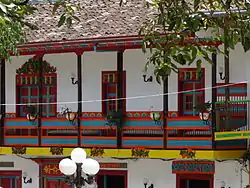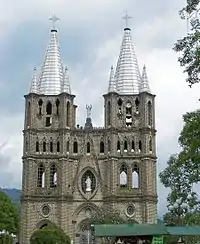Jardín
El Jardín, often simply referred to as Jardín (English: Garden), is a town and municipality in the southwest region of Antioquia, Colombia. It is bounded by the Andes, Jericó, and Támesis municipalities to the north and the Caldas department to the south. The municipality is located between the San Juan river, which is called Docató (meaning "River stones") by the natives, and a branch of the Western Cordillera. Jardín is identified by its preserved colonial architecture, lush vegetation, and abundant rivers and streams.
Jardín | |
|---|---|
Municipality and town | |
 | |
.svg.png.webp) Flag  Seal | |
 Location of the municipality and town of Jardín in the Antioquia Department of Colombia | |
 Jardín Location in Colombia | |
| Coordinates: 5°35′55″N 75°49′10″W | |
| Country | |
| Department | |
| Subregion | Southwestern |
| Area | |
| • Total | 224 km2 (86 sq mi) |
| Population (Census 2018[2]) | |
| • Total | 13,541 |
| • Density | 60/km2 (160/sq mi) |
| Time zone | UTC-5 (Colombia Standard Time) |
| Website | www |
Among others, rivers that flow through Jardin include the San Juan, Claro, and Dojurgo. Trout that is caught in the local rivers is a popular dish in the area.
The municipal anthem of the town is "Hymn to Jardín". Mean daily temperatures are 19°C with moderate humidity.
Toponymy
Regarding the name "Garden" (Spanish: Jardín) that belongs to this town, legend says that when the founders came to the Alto de las Flores ("Flower hilltop"), from the sietecueros village, they saw the valley that is today Jardín. At the time, it was entirely a jungle, full of white snakewood and crossed by two riachuelos. On seeing the beauty of the area, the settlers began to call it a garden.
History
The earliest evidence of human settlement in the area comes from graves that probably belonged to people of the Chamíes ethnicity and Catio language. These people were also known as "Docatoes", after the nearby Docató river.
Colonization of Antioquia was at its peak in the 1860s. During this time, a settler named Indalecio Peláez claimed huge tracts of land between two riachuelos known as Volcanes and El Salado in 1863. In 1864, Dr. José María Gómez Angel, a well-known priest, and two other priests came to Jardín after fleeing from General Mosquera, who at the time was in Medellín. These priests came up with the idea to create a more independent village in the area, and they discussed this idea with the aforementioned farmers and early settlers.
In 1871 Jardín was declared a parish. In 1882 it was declared a town by Luciano Restrepo, who at the time was the president of the then Antioquia State.
Architecture
Unlike some other municipalities of Antioquia, Jardín has remained largely unchanged for the last 140 years. The colonial architecture predominant throughout the area is characterized by whitewashed buildings with brightly painted doors, balconies, and cowhide chairs. Several of the chairs are hand-painted with scenes and landscapes from the local culture.
Demographics

According to figures presented by the DANE 2005 census, the ethnographic makeup of the township is as follows:
- Mestizo and White: 89.3%
- Indigenous: 10%
- Afro-Colombian: 0.7%
Economy
- Agriculture: coffee, plantain, sugarcane, and beans
- Tourism
- Trout fishing
- Artisan crafts, traditionally made by nuns
In the past, most inhabitants dedicated their lives to growing coffee, plantains, beans and sugarcane. Today, tourism is in this city is a basic source of income. The town is unique in having over 40 hotels, when larger municipalities of Antioquia usually do not have more than ten.
Places of interest
Main plaza
Like many traditional towns, the plaza is the main center of activity in Jardín. Principle Park, also known as El Libertador plaza, was declared a National Monument of Colombia in 1985. It is frequently visited for its nearby shops and inns. The floor is paved with rocks from the Tapartó river. The site features color wooden chairs and several gardens.[3]
The town's main church is the Basilica of the Immaculate Conception, declared a National Monument of Colombia in 1980. This basilica was built from hand-cut stones from the Tapartó river nearby in a Neo-Gothic style. It was declared a minor basilica in 2003.
Cable-car ride
Completed in 2007, Jardín has two cable-car lines. The lines were created to help peasants from the villages of La Selva, La Linda and La Salada enter the town to sell their goods and then return, and also to boost tourism.[4]
One cable-car ride to a local mountain peak known as the Flower Hilltop (Spanish: Alto de las Flores) or Cristo Rey, in reference to the statue on site, provides a great view of the town. It has a balcony for looking at the town and a cafe. As of Fall 2018, this cable car is not currently in operation, however you can also arrive by hiking.[5]
The second cable-car ride goes to a viewpoint by the name of La Garrucha on the opposite side of town from Alto de las Flores. There is a cafe and balcony with another great view of the town. This viewpoint can also be reached by vehicle or as part of a 4 mile hiking loop.[5]
Other attractions
Paintball in the Jardín countryside has also become a popular pastime in recent years.
Jardín is surrounded by several nature reserves that are popular tourist destinations. One example is where La Herrera ravine and La Bonita ravine join together, forming what is known as the "Heart Puddle" (Spanish: Charco Corazón).
Other places of interest include the following:
- Touring the colorful balconies of the houses and buildings in the municipality, many of which feature flowers.
- Cave of Splendor, which can be reached by walking 10 kilometers from the town.
- Clara Rojas Museum has 19th century furniture and relics from the colonization period of Antioquia.[3]
- Yellow-eared Parrot Nature Reserve
- Moto-Ratón Tour - These so-called "motorcycle mouses" are motorcycles that pull a small cart with people. They take visitors on a tour throughout the town.
- Trout farms, especially the "Estadero El Arka".
- Dulces de Jardin is a famous confectionery shop in the area, started in 1995 by Mariela Arango.[4]
- César Moisés Rojas Peláez House of Culture, which houses the ashes of Colombian writer Manuel Mejía Vallejo. This building opened in 1880.
- Santa Gertrudis Chapel
- "Morro Amarillo", which houses an indigenous cemetery.
Gallery
 La Herrera ravine
La Herrera ravine Principal Park
Principal Park
 Example of "motor mouses"
Example of "motor mouses" View of Jardín from the top of a cable-car stop
View of Jardín from the top of a cable-car stop Principal Plaza
Principal Plaza Angel Waterfall
Angel Waterfall
References
- "Municipalities of Colombia". statoids. Retrieved 29 April 2020.
- "Censo Nacional de Población y Vivienda 2018" (in Spanish). DANE. Retrieved 29 April 2020.
- Andrew Dier (10 June 2014). Moon Colombia. Avalon Travel Publishing. p. 526. ISBN 978-1-61238-628-7.
- Lopez, Néstor Alonso (3 November 2009). "El municipio antioqueño de Jardín busca afianzarse como marca". El Tiempo. Retrieved 24 March 2015.
- "Self-Guided Hikes in Jardin, Colombia". Intentional Travelers. Retrieved 3 December 2018.
External links
 Jardín travel guide from Wikivoyage
Jardín travel guide from Wikivoyage- Discover Colombia - Jardín
| Wikimedia Commons has media related to Jardín. |

